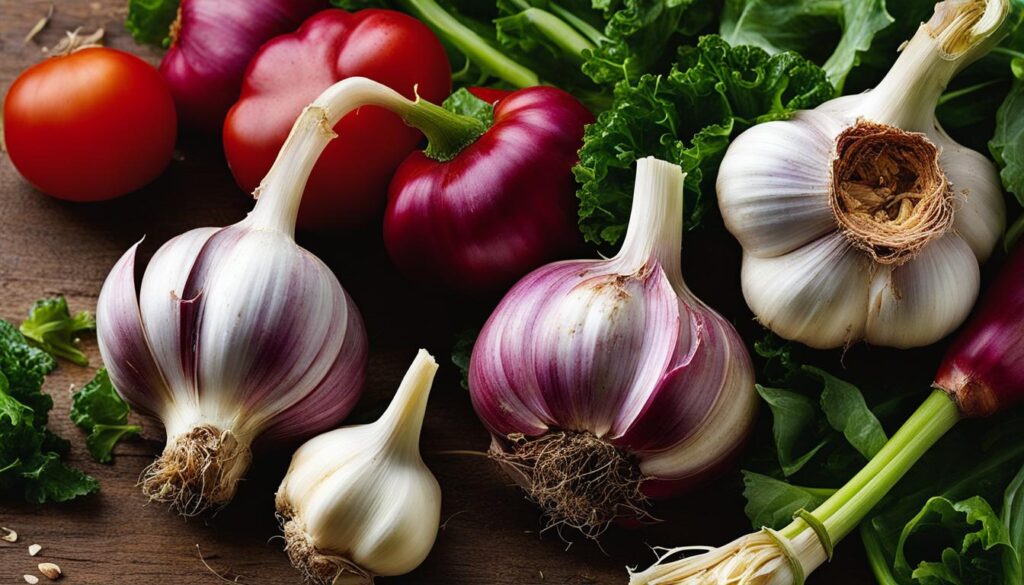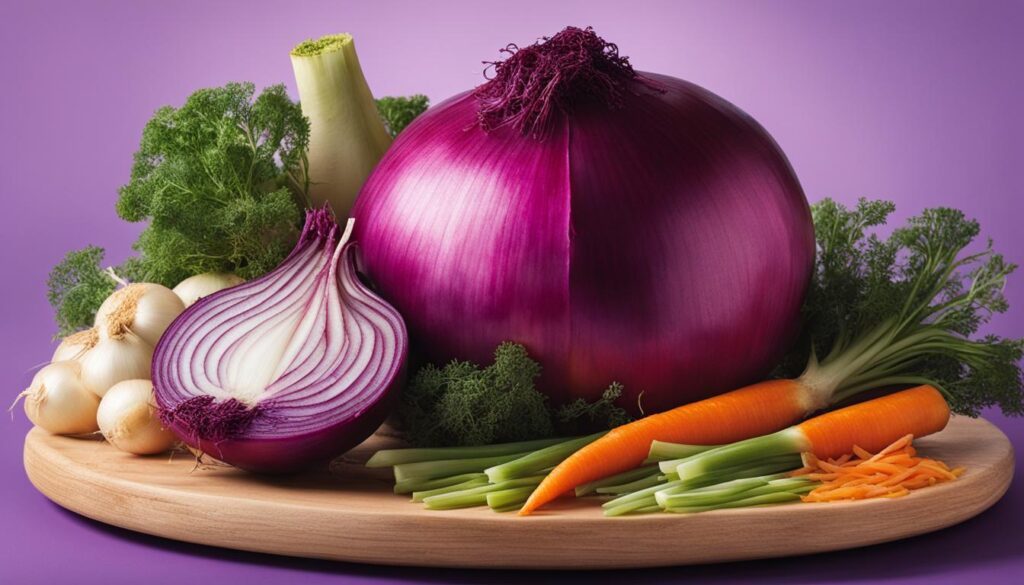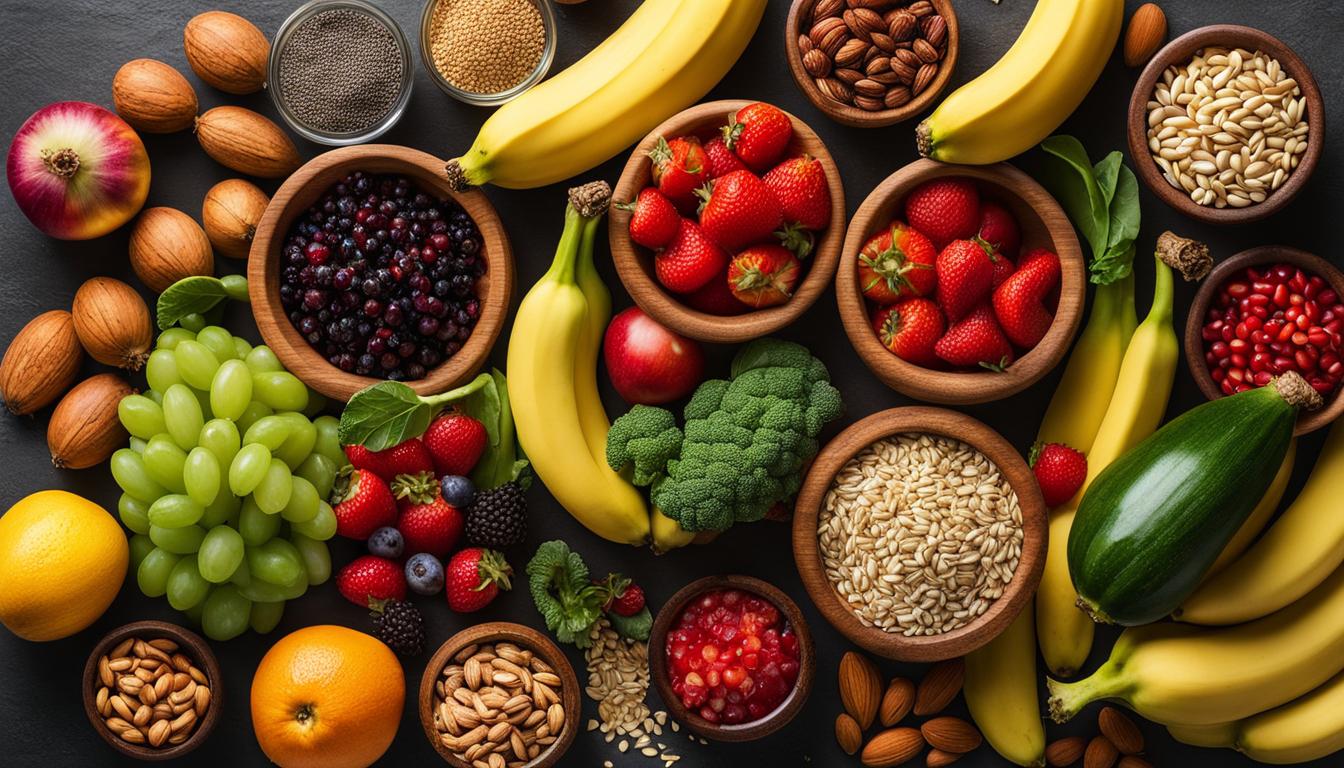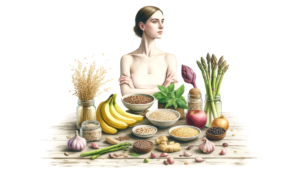If you are looking to enhance your gut health naturally, Begin with prebiotic foods!
Prebiotic foods are packed with fiber that feeds your friendly gut bacteria, leading to numerous benefits for your digestive system. In this article, we will explore the world of prebiotic foods and discover how they can naturally boost your gut health.
Prebiotic foods are not to be confused with probiotics. While probiotics are live bacteria found in certain foods or supplements, prebiotics are types of fiber that provide nourishment to your gut bacteria. By consuming prebiotic foods, you can promote a healthier digestive system, improve nutrient absorption, and support immune function.
In this article, we will dive into the top prebiotic-rich options, including chicory root, dandelion greens, Jerusalem artichoke, garlic, onions, and oats. These foods are not only delicious but also offer a wide range of benefits for your gut health. Whether you’re looking to improve digestion, relieve constipation, boost your immune system, or regulate blood sugar levels, there’s a prebiotic food that can help.
Key Takeaways:
- Prebiotic foods are fiber-rich options that feed your friendly gut bacteria.
- Consuming prebiotic foods can improve digestion, support immune function, and enhance nutrient absorption.
- Chicory root, dandelion greens, Jerusalem artichoke, garlic, onions, and oats are excellent sources of prebiotics.
- These prebiotic foods offer a range of benefits, including improved digestion, constipation relief, boosted immune system, and better blood sugar control.
- Incorporating prebiotic foods into your diet is a natural and effective way to promote gut health.
Understanding Prebiotics and Their Benefits
When it comes to gut health, prebiotics play a significant role. Unlike probiotics which are live bacteria, prebiotics are types of fiber that provide nourishment to the friendly bacteria in your gut. By incorporating prebiotic-rich foods into your diet, you can support a healthier digestive system, improve nutrient absorption, and enhance overall immune function.
Prebiotics, as a form of dietary fiber, are resistant to digestion in the small intestine and instead travel to the colon, where they serve as fuel for the beneficial bacteria. This stimulation of the growth and activity of the good bacteria can have numerous positive effects on your digestive system and overall well-being.
Although all prebiotics are fiber, not all fiber is prebiotic. Classification of a food ingredient as a prebiotic requires scientific demonstration that the ingredient [2]:
(Slavin 2013)
The Benefits of Prebiotic Foods
Consuming prebiotic foods offers a range of benefits for your gut health and digestive system. Here are some key advantages:
- Improved Digestion: Prebiotics help regulate bowel movements and promote regularity. They can alleviate symptoms such as bloating, abdominal discomfort, and constipation.
- Enhanced Nutrient Absorption: By promoting the growth of beneficial bacteria in the gut, prebiotic foods can improve the absorption of essential nutrients, such as calcium, iron, and magnesium.
- Support for a Healthy Gut Microbiome: Prebiotics contribute to a diverse and balanced gut microbiome, which is associated with better overall health and a reduced risk of various diseases.
- Enhanced Immune Function: A healthy gut is closely linked to a strong immune system. Prebiotics can help stimulate the immune response and protect against infections and other immune-related disorders.
Below are several examples of food plants that are abundant in prebiotics; categorised accordingly as cultivated and wild plants.
Cultivated plants
Wild Plants:
A Comparative Table of Prebiotic Foods
| Prebiotic Food | Key Prebiotic Fiber | Additional Benefits |
|---|---|---|
| Chicory Root | Inulin | Improves digestion, relieves constipation |
| Dandelion Greens | Inulin | Boosts immune system, anti-inflammatory properties |
| Jerusalem Artichoke | Inulin | Supports metabolic health, rich in thiamin for immune function |
| Garlic | Inulin, oligofructose | Cardiovascular benefits, anti-inflammatory effects |
| Onions | Inulin, FOS | Boosts immune system, antioxidant properties |
| Oats | Beta-glucan | Regulates blood sugar, rich in fiber for digestion |
Chicory Root: A Powerful Prebiotic Food
When it comes to prebiotic foods, chicory root stands out as a potent option with multiple health benefits. Not only does it add a delightful coffee-like flavor to your beverages, but it also packs a punch in terms of prebiotic fiber and its positive impact on digestion, constipation, and glucose control.
Chicory root contains a type of prebiotic fiber called inulin, which acts as fuel for the growth of beneficial gut bacteria. This fiber remains intact throughout the digestive process, reaching the large intestine where it ferments and stimulates the growth of friendly microbes, thereby promoting a healthy gut microbiome. Additionally, inulin has been found to enhance the absorption of essential nutrients, further supporting overall digestive health.
One of the notable benefits of consuming chicory root is its potential to relieve constipation. The prebiotic fiber present in chicory root acts as a natural regulator, helping to soften stools and promote regular bowel movements. By incorporating chicory root into your diet, you can experience improved digestion and enhanced gut regularity.
Furthermore, chicory root has been found to help in controlling glucose levels, making it particularly beneficial for individuals managing blood sugar. The presence of inulin in chicory root promotes a slower release of glucose into the bloodstream, preventing spikes and aiding in blood sugar control.
Chicory Root Nutritional Profile
Not only is chicory root a rich source of prebiotic fiber, but it also offers various other essential nutrients:
| Nutrient | Amount per 100g |
|---|---|
| Inulin Fiber | 36g |
| Vitamin C | 18mg |
| Vitamin B6 | 0.2mg |
| Potassium | 620mg |
| Manganese | 0.9mg |
| Magnesium | 13mg |
With its impressive nutritional profile, chicory root is a valuable addition to any diet seeking to enhance gut health and overall well-being.
Dandelion Greens: A Fiber-Rich Prebiotic Option
Dandelion greens, often used in salads, are a great source of fiber. They contain inulin fiber, which increases friendly gut bacteria, improves digestion, and boosts the immune system. Dandelion greens also have anti-inflammatory and antioxidant properties.
Rich in essential nutrients and minerals, dandelion greens offer numerous health benefits. The high fiber content supports digestive health by promoting regular bowel movements and preventing constipation. Additionally, dandelion greens are packed with vitamins A, C, and K, which contribute to overall immune system function.
| Nutrient | Amount per 100g |
|---|---|
| Calories | 45 |
| Fiber | 1.9g |
| Vitamin A | 5081 IU |
| Vitamin C | 35mg |
| Vitamin K | 778.4 mcg |
In addition to their immune-boosting properties, dandelion greens possess antioxidant compounds that help protect against oxidative stress and reduce inflammation in the body. Research suggests that the antioxidants in dandelion greens may have potential anti-cancer effects as well.
Whether enjoyed in salads, sautéed, or blended into green smoothies, incorporating dandelion greens into your diet is an excellent way to reap the benefits of their fiber-rich, prebiotic goodness. Enhancing your gut health with dandelion greens can support overall gastrointestinal function, strengthen the immune system, and contribute to your overall well-being.
Jerusalem Artichoke: A Nutrient-Dense Prebiotic Vegetable
Jerusalem artichoke, also known as sunroot, is a nutrient-packed vegetable that offers a variety of health benefits. This versatile root vegetable is not only delicious but also rich in essential nutrients that support overall well-being.
One notable benefit of Jerusalem artichoke is its high content of inulin-rich fiber. With approximately 2 grams of inulin-rich dietary fiber per 100 grams, Jerusalem artichoke provides a significant source of prebiotics.
Inulin fiber plays a crucial role in promoting digestive health by increasing the population of friendly bacteria in the colon. These beneficial bacteria aid in the breakdown and absorption of nutrients, ensuring proper digestion and maximizing nutrient availability.
In addition to its impact on digestive health, the inulin-rich fiber found in Jerusalem artichoke also offers benefits for metabolic health. Studies have shown that consuming inulin can help regulate blood sugar levels and improve insulin sensitivity, making it beneficial for individuals with metabolic conditions such as diabetes.
Furthermore, Jerusalem artichoke contains thiamin, a vital nutrient that supports immune function. Thiamin plays a crucial role in the body’s ability to defend against pathogens and maintain a healthy immune system. By incorporating Jerusalem artichoke into your diet, you can provide your body with a natural source of thiamin, enhancing your immune system and reducing the risk of illnesses.
Overall, Jerusalem artichoke is a nutrient-dense vegetable that offers numerous health benefits. From its inulin-rich fiber that promotes digestive health to its immune-supporting thiamin content, this versatile vegetable is a valuable addition to any diet. By incorporating Jerusalem artichoke into your meals, you can support your immune system, improve your metabolic health, and enjoy the delicious flavors this unique vegetable has to offer.
Garlic: A Flavorful Prebiotic Herb
Garlic is not just a delicious addition to your meals; it also offers numerous prebiotic benefits. Packed with compounds that promote the growth of beneficial gut bacteria, garlic plays a vital role in maintaining a healthy digestive system.
Studies have shown that garlic contains prebiotic fibers, such as inulin and fructooligosaccharides (FOS), that act as a food source for the good bacteria in your gut. By nourishing these beneficial bacteria, garlic helps maintain a balanced microbiome and supports optimal gut health.
Furthermore, garlic has been linked to various cardiovascular benefits. Research suggests that the compounds found in garlic have the potential to reduce cholesterol levels and lower blood pressure, thereby promoting cardiovascular health.
In addition to its prebiotic and cardiovascular benefits, garlic also exhibits anti-inflammatory effects. It contains sulfur compounds, such as allicin, that possess antioxidant and anti-inflammatory properties. These compounds help reduce inflammation in the body, which is important for overall health and wellbeing.
Moreover, garlic may assist in blood glucose regulation, making it beneficial for individuals with diabetes or those looking to manage their blood sugar levels. Studies have shown that garlic can improve insulin sensitivity and enhance glucose metabolism, contributing to better blood sugar control.
To maximize the prebiotic benefits of garlic, it’s best to consume it raw or lightly cooked. Crushing or chopping garlic cloves and allowing them to sit for a few minutes before cooking can enhance the release of its beneficial compounds.

Onions: Versatile Prebiotic Vegetables
Onions are not only a flavorful addition to various dishes, but they are also a powerhouse of health benefits. These versatile prebiotic vegetables contain important compounds that contribute to a healthy gut and overall well-being.
One of the key components of onions is inulin, a type of prebiotic fiber that serves as a fuel source for beneficial gut bacteria. Inulin helps support the growth of these friendly bacteria, which play a crucial role in maintaining a healthy digestive system.
Furthermore, onions are rich in another prebiotic fiber called fructooligosaccharides (FOS). Similar to inulin, FOS also provides nourishment to gut bacteria, aiding in their proliferation and diversity.
The presence of inulin and FOS in onions has been linked to various health benefits. Firstly, these prebiotic fibers help strengthen the immune system by supporting the production of beneficial short-chain fatty acids, which have anti-inflammatory properties. A strong immune system is essential for protecting the body against infections and diseases.
Moreover, the prebiotic properties of onions contribute to improved digestion. The fibers act as a natural laxative, promoting regular bowel movements and preventing constipation. They also help enhance the absorption of essential nutrients from food, maximizing their benefits for the body.
Onions are not only beneficial for the gut; they also possess antioxidant and antibiotic properties. Antioxidants help protect the body against oxidative stress and reduce the risk of chronic diseases. Antibiotics, on the other hand, can help combat harmful pathogens in the body, further supporting the immune system.
Recipes for a Healthy Gut
If you’re looking to incorporate more onions into your diet to boost your gut health, here are a few recipe ideas:
- Caramelized Onion and Goat Cheese Tart
- Grilled Onion and Vegetable Skewers
- French Onion Soup
- Roasted Brussels Sprouts with Balsamic Caramelized Onions
- Sautéed Onions with Quinoa and Spinach
By including these delicious onion-based dishes in your meal planning, you can enjoy the nutritional benefits and support the growth of beneficial gut bacteria.
Next, we will explore another prebiotic option – oats, a fiber-rich grain that can contribute to a healthy gut and overall well-being.
| Key Benefits of Onions | Description | |
|---|---|---|
| Boosts the immune system | Inulin and FOS in onions support the production of beneficial short-chain fatty acids, which promote immunity. | |
| Improves digestion | The prebiotic fibers in onions act as a natural laxative, aiding in regular bowel movements and nutrient absorption. |  |
| Provides antioxidant properties | Onions contain antioxidants that help protect the body against oxidative stress and reduce the risk of chronic diseases. | |
| Possesses antibiotic properties | Antibiotics in onions can help combat harmful pathogens in the body, contributing to a healthy immune system. | |
Oats: A Fiber-Rich Prebiotic Grain
Oats, a beloved breakfast staple, offer more than just a hearty meal to start your day. These grains are a nutritional powerhouse, rich in fiber and packed with prebiotic benefits. Incorporating oats into your diet can have a positive impact on your gut health, blood sugar control, and overall well-being.
One of the key components of oats that contribute to their prebiotic properties is beta-glucan fiber. Beta-glucan acts as a food source for the beneficial bacteria in your gut, promoting the growth of a healthy gut microbiome.
The consumption of oats has been linked to improved blood sugar control, making it an excellent choice for individuals with diabetes or those looking to prevent the onset of the condition. The beta-glucan fiber in oats slows down the digestion and absorption of carbohydrates, resulting in a more gradual and steady release of glucose into the bloodstream. This helps to prevent spikes in blood sugar levels and promotes better glycemic control.
But the benefits of oats go beyond gut health and blood sugar control. Research suggests that the beta-glucan fiber in oats may have potential anti-cancer properties. It has been found to enhance the immune system’s response to cancer cells and inhibit tumor growth.
In addition to its effect on gut bacteria and blood sugar control, oats also help regulate digestion. The high fiber content of oats promotes healthy bowel movements and prevents constipation. Moreover, the soluble fiber in oats absorbs water and adds bulk to the stool, making it easier to pass.
Whether enjoyed as a steaming bowl of oatmeal, added to smoothies, or incorporated into baked goods, oats are a versatile and delicious way to boost your gut health and overall wellness.
Conclusion
Incorporating prebiotic foods into your diet is a natural and effective way to boost your gut health. These fiber-rich options play a crucial role in promoting the growth of friendly gut bacteria, which is essential for maintaining a healthy digestive system. By including prebiotic foods like chicory root, dandelion greens, garlic, and onions in your meals, you can naturally enhance your gut health and enjoy the numerous benefits associated with a well-functioning digestive system.
Gut health is not just limited to digestion, but also impacts your overall well-being. A healthy gut contributes to overall immune function, nutrient absorption, and even influences mental health. By nurturing your gut with prebiotic foods, you can create a foundation for optimal health and well-being.
Make it a habit to include these prebiotic-rich options in your diet regularly, and you will see improvements in your gut health over time. Remember, small changes can make a big difference! Prioritize natural gut health by incorporating prebiotic foods into your meals and experience the transformative effects they can have on your overall well-being.
FAQ
What are prebiotics?
Prebiotics are types of fiber that feed your friendly gut bacteria, leading to numerous benefits for your digestive system.
What is the difference between prebiotics and probiotics?
Probiotics are live bacteria found in certain foods or supplements, while prebiotics are types of fiber that provide nourishment to your gut bacteria.
How do prebiotics promote gut health?
Consuming prebiotic foods can promote a healthier digestive system, improve nutrient absorption, and support immune function.
What are the benefits of chicory root as a prebiotic food?
Chicory root is rich in prebiotic fiber called inulin, which promotes the growth of friendly gut bacteria and can improve digestion, relieve constipation, and help control glucose levels.
How do dandelion greens support gut health?
Dandelion greens are a great source of fiber, including inulin fiber, which increases friendly gut bacteria, improves digestion, boosts the immune system, and possesses anti-inflammatory and antioxidant properties.
What makes Jerusalem artichoke a nutrient-dense prebiotic vegetable?
Jerusalem artichoke provides inulin-rich dietary fiber, which helps increase friendly bacteria in the colon, promotes digestive health, aids in mineral absorption, and contains thiamin that supports immune function and prevents fatigue.
How does garlic contribute to gut health?
Garlic contains compounds that promote the growth of beneficial gut bacteria, prevent disease-promoting bacteria from growing, and is also linked to cardiovascular benefits, anti-inflammatory effects, and blood glucose regulation.
What are the benefits of onions as prebiotic vegetables?
Onions are rich in inulin and other prebiotic fiber called FOS, which help boost the immune system, provide fuel for gut bacteria, improve digestion, and possess antioxidant and antibiotic properties.
What makes oats a fiber-rich prebiotic grain?
Oats contain beta-glucan fiber, which increases healthy gut bacteria, improves blood sugar control, and has potential anticancer properties. Oats also help regulate digestion and keep you feeling full longer.



The amount of effort that you put into it was very impressive to observe. Despite the fact that the picture is appealing and your writing style is elegant, it appears that you are concerned about the fact that you ought to be providing the following content. In the event that you take care of this hike, I will almost definitely return to come back and read more of your work.
Thanks Elenora